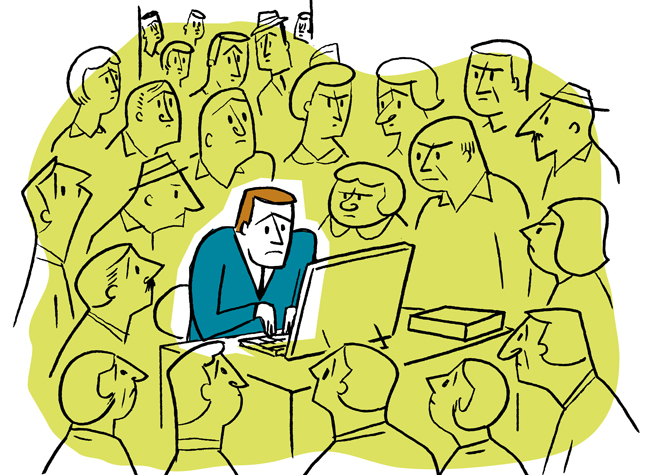Is it just me or has there been an onslaught of privacy-related issues lately? Whether it was the defiant acts of Julian Assange and Edward Snowden or the Target data breach, it seems that the ideas of privacy and security have ominously loomed in the collective consciousness. Even this week’s scandal related to L.A. Clippers’ owner Donald Sterling rehashes the issue, just framed in a different way. So, let’s consider for a moment what privacy is and why we should value and/or surrender it.
Privacy, in the most basic sense of the word, is the state of being away from other people or from public attention.[i] The right to privacy is, then, the freedom from unauthorized intrusion into one’s state of being away from public attention. (I’m not concerned with defining what is an authorized versus unauthorized intrusion, but am instead focused on the idea of separateness from public attention.) As people living together in society, there are things that are obviously good to keep private, like our bank account numbers and our social security numbers. There are also things that are not good to keep totally private, for the sake of convenience. For example, we like to have guests over for dinner every now and then and would think it unreasonable to blindfold and chauffer them to our home that we might keep our address a secret. Furthermore, we like having electricity and Internet service and running water and mail delivery, so we let utility companies and the postal service know where we live. We’re even willing to endure a barrage of unwanted catalogues because we value the convenience of online shopping and free home delivery.
It seems funny in some ways to be talking about privacy at all because so much of life seems to be public. We constantly update Facebook and Twitter, whether we’re at home or in public. We open our lives up to others in many ways because of the digital landscape. Yet, I think there is still a part of us that deeply values privacy, even though we click Yes to privacy agreements without having read them. We simultaneously get unnerved at the idea of the NSA collecting zillions of pieces of data and publicize our preferences, updating them daily, hourly, for others to see. We’re just weird like that. We walk the line between wanting to be known and wanting to be unknown.
I think that some of this uncertainty about privacy comes from the fact that it can be either a place of refuge or a place of license. When we’re at home, away from the public sphere—the agora—we’re free to express ideas and opinions that we might not feel at liberty to express publicly. That’s the blessing of privacy, but it’s also its curse. It’s the place where our attitudes and opinions may go unchecked and we may harbor sentiments that the public would find utterly appalling, sentiments like those of Donald Sterling.[ii]
As a Christ follower, I’ve struggled with the idea of privacy, since the private sphere seems to be the place where my soul can incur some serious damage. When I am away from others I am more likely to act without reference to others. The places in my life that are “none of your business” are usually the ones I want to hide because they are sinful. If I am not doing anything wrong, then I feel little compulsion to retreat. And if I am doing something wrong, I am supposed to bring it into the light, confess my sin to God and to others and repent of it. Furthermore, if I am tempted to engage in unlawful activity, be it in the public sphere or private, I am to submit myself to the law of the land because that is my calling as a disciple of Christ. As Paul writes:
Let everyone be subject to the governing authorities, for there is no authority except that which God has established. The authorities that exist have been established by God. Consequently, whoever rebels against the authority is rebelling against what God has instituted, and those who do so will bring judgment on themselves. For rulers hold no terror for those who do right, but for those who do wrong. Do you want to be free from fear of the one in authority? Then do what is right and you will be commended. For the one in authority is God’s servant for your good. But if you do wrong, be afraid, for rulers do not bear the sword for no reason. They are God’s servants, agents of wrath to bring punishment on the wrongdoer. Therefore, it is necessary to submit to the authorities, not only because of possible punishment but also as a matter of conscience. This is also why you pay taxes, for the authorities are God’s servants, who give their full time to governing. Give to everyone what you owe them: If you owe taxes, pay taxes; if revenue, then revenue; if respect, then respect; if honor, then honor. Let no debt remain outstanding, except the continuing debt to love one another, for whoever loves others has fulfilled the law. The commandments, “You shall not commit adultery,” “You shall not murder,” “You shall not steal,” “You shall not covet,” and whatever other command there may be, are summed up in this one command: “Love your neighbor as yourself.” Love does no harm to a neighbor. Therefore love is the fulfillment of the law. (Rom. 13:1-10 NIV, bold mine)
So, perhaps we can reasonably hold onto privacy rights inasmuch as doing so is a loving act: protecting the safety of one’s family, maintaining the security of one’s livelihood, and such. However, maybe there are some times when we need to admit that our love of privacy is a thinly veiled attempt to hold on to sinful attitudes and behaviors. After all, the command to love our neighbors as ourselves is not a respecter of privacy.





Leave a Reply
Your email is safe with us.